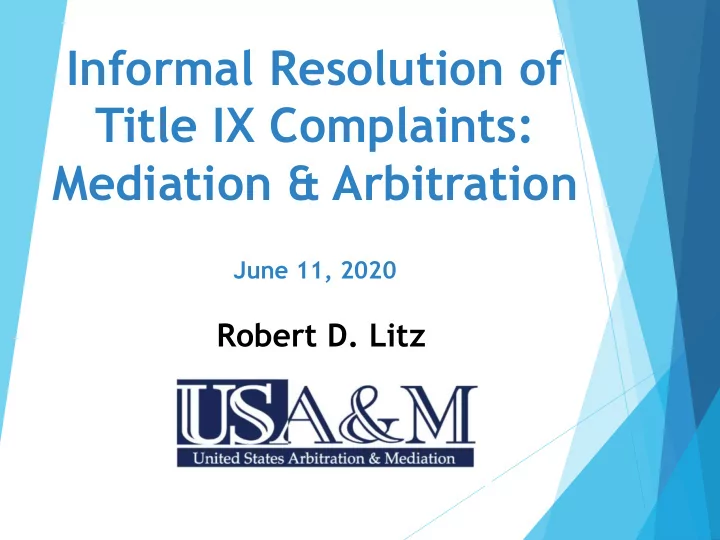

Informal Resolution of Title IX Complaints: Mediation & Arbitration June 11, 2020 Robert D. Litz
Common forms of Informal Resolution (ADR)
Most common Alternative Dispute Resolution processes
What is Mediation u Process of assisted negotiation in which a neutral person helps people reach agreement. u Mediator: Impartial third party u Consensual u Informal u Confidential process u Parties are the decision makers
What is Arbitration u Neutral person acts like a judge u Reviews evidence (testimony & documents) u Applies the facts to the law u Decides outcome u Confidential process guided by arbitration agreement of the parties and applicable rules
Restorative Justice Focus on Repairing the Harm
Benefits of Mediation u Parties determine outcome u Resolution can be creative u Faster u Cheaper u Can be confidential
Mediation: 3 Legged Stool u Cost u Time u Risk
Mediation Process u Initial Caucus with each party u Joint sessions (Optional) u Meet and Greet; or u Description of claims/defenses u Not an Opening Statement to a jury u Opportunity for Apology/Acknowledgment u Shuttle diplomacy u If resolved: Mediated Settlement Agreement
Mediation preparation It takes time u Attorney: Mediator Brief/Position Paper u Client: prepare for what to expect, process, timeframe u Explain strengths and weaknesses to client u Plan starting and ending point u Prepare Litigation Budget and Risk Assessment u Be open to the PROCESS
Before Mediation u Who should attend from your side ? Decision makers? u If decision maker is not available in person, communicate via video conference or telephone u Who should not attend?
Before Mediation u Come to mediation with authority u Think about the alternatives if no settlement [BATNA]
During Mediation u How to deal with the problem client and/or attorney? u Dealing with the Complainant’s attorney who does not understand the case issues? u Dealing with the Respondent’s attorney who does not appreciate the case issues? u Give the mediator a “heads up” about the issue & solicit her/his assistance/suggestions
During Mediation u When to have an opening joint session, when only a “meet and greet” or none? u Mediators can use a “controlled agenda” (more than “meet & greet” but less than full-blown opening) u Mediation is fluid. Be flexible & creative. u Beware of Backward Steps
During Mediation u Recognizing the drama taking place in the Complainant’s caucus u Recognizing the decisions taking place in the Respondent’s caucus u Recognizing the school’s concerns regarding the Complainant, Respondent, School Code of Conduct, reputation, publicity u When to move fast and when to move slowly. When is it closing time.
During Mediation u The difference between an acknowledgement and apology and when to use each. u The power of apology.
During Mediation u What does your offer/demand mean (give rationale) u Mediator Proposals u Use mediation to strengthen relationship between school and students
Using the Mediator u Using (but not abusing) the mediator u Truth telling u Holding back u Ask Mediator for his/her opinion or suggestions. Use as sounding board
If No Settlement: Soft Landing
Questions
Recommend
More recommend